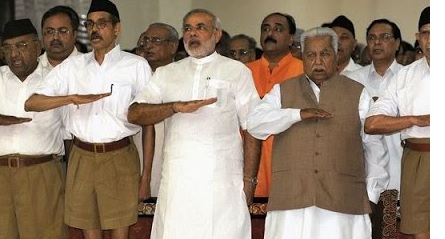
By AW Siddiqui
A 2019 research in Belgium revealed evidence that deficits in emotion understanding and emotion management are related to right-wing and prejudiced attitudes. It found that people with lower emotional intelligence have less empathy and are less able to assume the perspective of others.
Right-wing authoritarianism is simply the tendency to submit to political authority and, most importantly, be hostile towards people outside of their groups - such as minorities.
The ground breaking study was lead by Alain Van Hiel, a professor at the University of Ghent, in Belgium and published in the journal Emotion.
“I have a lifelong interest in political psychology and in political ideology in particular. The observation that left-wing and right-wing adherents tend to differ on so many psychological characteristics is amazing,” said Hiel.
"The aim of this study was 2-fold: (a) to investigate the relationship between emotional abilities and right-wing and prejudiced attitudes, and (b) to pit the effects of emotional and cognitive abilities on these attitudes against each other.", the study reads.

In two studies, the researchers assessed the emotional and cognitive abilities, and political ideology of 983 Belgian undergraduate students. The second study also examined the participants’ cognitive ability. Emotional ability was measured with three tests: the Situational Test of Emotional Understanding, the Situational Test of Emotion Management, and the Geneva Emotion Recognition Test.
According to PsyPost, the researchers found that people who score lower on emotional intelligence tests - particularly emotional understanding and management — tended to score higher on a measure of right-wing authoritarianism and social dominance orientation.
Right-wing authoritarianism is a personality trait that describes the tendency to submit to political authority and be hostile towards other groups, while social dominance orientation is a measure of a person’s preference for inequality among social groups.
“The results of this study were univocal. People who endorse authority and strong leaders and who do not mind inequality - the two basic dimensions underlying right-wing political ideology - show lower levels of emotional abilities,” Van Hiel told PsyPost.
Those with lower emotional and cognitive abilities were also more likely to agree with blatantly prejudiced statements such as “The White race is superior to all other races”, or Aryan race is supreme, or the Hindutva fervour currently seen in India among the ruling regime and its supporters.
Psychologists have long been interested in how personality traits and cognitive abilities relate to political ideologies and prejudice. Past research, for example, has shown that people with lower cognitive abilities are more likely to hold right-wing and prejudiced attitudes. But relatively few studies have examined how emotional intelligence factors into the mix.

The results of this study echo those of a similar 2017 study, which indicated that people who scored lower in trait Emotional Intelligence were more likely to hold right-wing and subtly racist views.
We've long known that intellectual abilities and political views were somehow related. Science took care to show that fact before. More specifically, many studies have shown that prejudice and authoritarian right-wing attitudes were somehow linked to lower reasoning skills on average, and that discovery is pretty revealing in itself.
But the new study reveals that it's not only abstract reasoning and cognitive abilities that are significant. Emotional intelligence is also systematically linked to our political views.
“The results have been obtained in one particular context. Would similar results be obtained in other contexts besides in a Western country with a long-standing stable democracy? Whether these tendencies are universal, or limited to particular contexts, is very intriguing.” said Hiel
The study, “The Relationship Between Emotional Abilities and Right-Wing and Prejudiced Attitudes“, was authored by Alain Van Hiel, Jonas De keersmaecker, Emma Onraet, Tessa Haesevoets, Arne Roets, and Johnny R. J. Fontaine.




